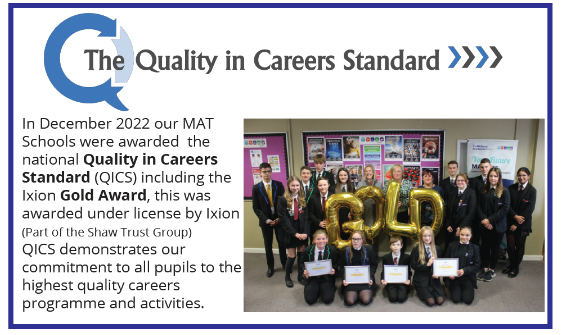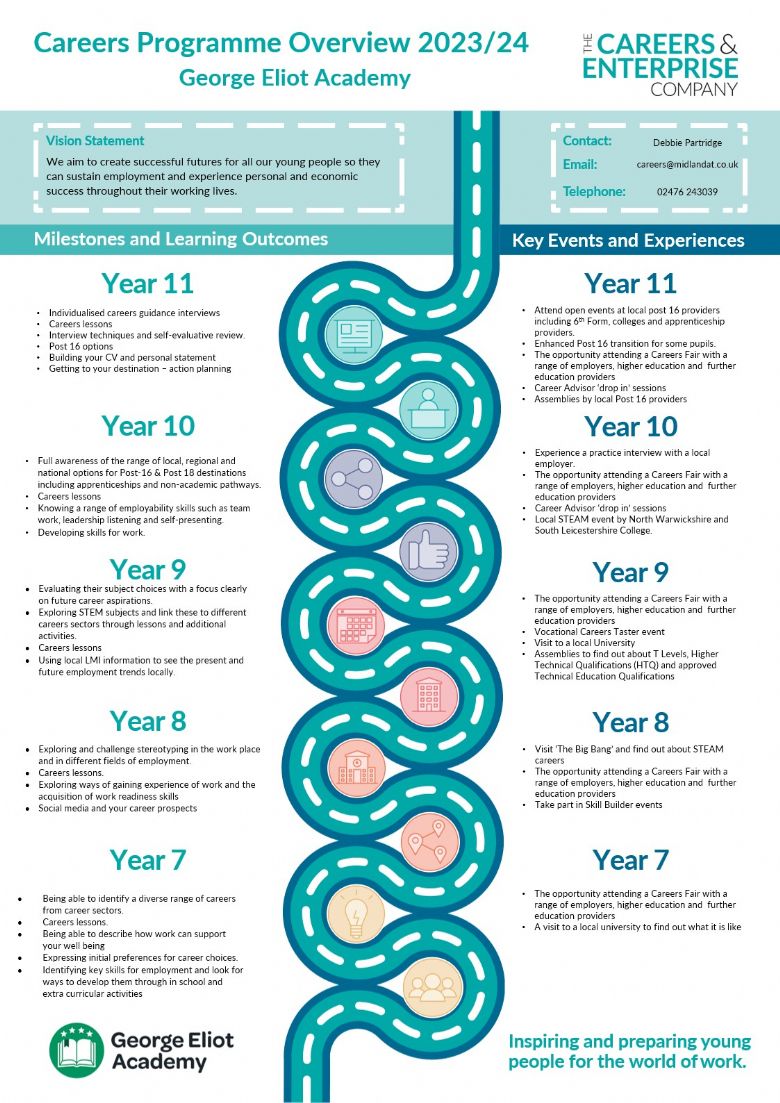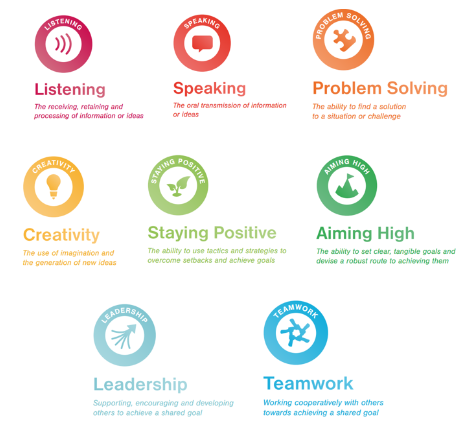CAREERS EDUCATION
At George Eliot Academy, we have a team of staff who work together to deliver quality and impartial CEIAG. For any careers enquiries, please contact:
-
Sophie Smith – Careers Leader
At The George Eliot Academy we aim to promote a progressive career provision that is linked to our STAR values of Self-Discipline, Tenacity, Ambition and Responsibility.
Our effective and impartial career programme, together with a knowledge rich curriculum, we empower our young people to learn and place their best interests at the centre of everything we do. We aim to support the aspirations of all our learners and ensure they gain the skills, competencies and experiences they require to progress in their learning and the world of work. By aligning our careers provision to the Gatsby and CDI frameworks, we can give our young people the knowledge and the cultural capital they need to flourish and succeed as individuals in their future careers. All pupils are entitled to a programme that will encourage their career development to be a continual process. We work in conjunction with parents, guardians, teaching staff and local industry to provide a high-quality programme for the pupils at The George Eliot Academy.
competencies and experiences they require to progress in their learning and the world of work. By aligning our careers provision to the Gatsby and CDI frameworks, we can give our young people the knowledge and the cultural capital they need to flourish and succeed as individuals in their future careers. All pupils are entitled to a programme that will encourage their career development to be a continual process. We work in conjunction with parents, guardians, teaching staff and local industry to provide a high-quality programme for the pupils at The George Eliot Academy.
Our ambitious, progressive programme contains age appropriate content and activities and delivers a wide range of opportunities and experiences for all pupils. It encourages our pupils to understand the variety of future pathways available including technical, vocational and academic routes.
Our aim is for our students to become more independent, confident and resilient learners, who can be respectful to one another’s career choices, challenge stereotypes, and understand the link between learning and the world of work, with an appreciate for the value of lifelong learning, so they can make a positive contribution to society.
Our current Careers Advisers are Debbie Partridge and Caroline Denny. They are able to give students at The George Eliot Academy information, advice, guidance and support on a number of areas including Careers Education.
Career Curriculum
What to expect from your school careers programme
-
All pupils in years 7-11 access a programme of lessons within the PSHE curriculum, which focus on different aspects of careers and employability skills.
-
All pupils complete a short careers survey to help us identify several career sectors they are interested in, so we are able to direct opportunities to genuine interests.
-
Local business and employers visit our schools to offer practice interviews and attend an annual Careers Fair, which is open to all pupils and parents.
-
Access to online resources to support careers development such as e-Clips helping pupils to research careers independently.
-
We offer access to businesses, employers, Post 16 providers to deliver talks and assemblies each year to make sure all pupils know the opportunities available to them when they leave school.
-
In Year 10 and 11, every pupil has a 1:1 guidance interview with one of our Level 6 Careers Advisors. Parents and carers are able to attend this interview if they would like to.
-
We actively promote access to a wide range of careers to all pupils challenging stereotypes and careers, which traditionally have been gender-specific.
-
We encourage the development of work ready skills through our curriculum and extracurricular activities.

Career Charter
What to expect from your school careers programme
-
All pupils in years 7-11 access a programme of lessons within the PSHE curriculum, which focus on different aspects of careers and employability skills.
-
All pupils complete a short careers survey to help us identify several career sectors they are interested in, so we can direct opportunities to genuine interests.
-
All pupils will have at least one Employer Encounter during each year at school. These encounters include visits to local universities, national careers events such as The Big Bang and The World Skills Show.
-
Local business and employers visit our schools to offer practice interviews and attend an annual Careers Fair, which is open to all pupils and parents.
-
Access to online resources to support careers development such as e-Clips or Let’s Do Business helping pupils to research careers independently.
-
We offer access to businesses, employers, post 16 providers to deliver talks and assemblies each year to make sure all pupils know the opportunities available to them when they leave school.
-
In Year 10 and 11, every pupil has a 1:1 guidance interview with one of our Level 6 Careers Advisors. Parents and carers can attend this interview if they would like to.
-
We actively promote access to a wide range of careers to all pupils challenging stereotypes and careers, which traditionally have been gender specific.
-
We encourage the development of work ready skills through our curriculum and extra-curricular activities.
How you can support your child in their career journey
-
Please talk to your child about their career interests, if they do not know what they would like to do focus on developing their work ready skills through activities, hobbies, and interests.
-
Take advantage of the many employer encounters offered during the year, sometimes a visit out of school can motivate and provide pupils with direction in their career planning.
-
Contact the school if you need support of any aspects of careers, or if you can support the school careers programme.
-
If your child has benefitted from a career experience, please let us know, we would love to hear from you on what they enjoyed helping us enhance careers experiences for others Please email Sophie.smith@georgeeliotacademy.org.uk
-
A useful website to support - https://www.parentalguidance.org.uk/
Skills Builder
Future employers are looking for well qualified young people who are enthusiastic and willing to make a positive start to their career.
To help our pupils get ready for work we promote a wide range of work readiness skills throughout our curriculum by working with the Skills Builder. Partnership.
These are the skills young people need to succeed in education and beyond into employment. Working with the Skills Builder Partnership supports our careers strategy, providing engaging resources for building essential employability skills.

Policies
Policies
Policies aligned to Careers Education including our brand new employer access policy which enables direct contact between employers and school.
Careers updates and newsletters
Accordion content
Career activities
Accordion content
How can I help as a parent?
Accordion content
Warwickshire local labour market

Careersmart | Careers and job market information)
Careersmart is an independent and impartial careers website it aims to enable individuals to be informed and confident in their career choices and decisions.
Success at School The Best Websites to Find Labour Market Information (successatschool.org)
The best websites to find Labour Market Information
Post 16 options
Pupil passports
Accordion content
The Gatsby Benchmarks are a framework of 8 guidelines that define the best careers provision in schools and colleges. Our careers strategy is built around them, and they make a great place to start for planning or improving our programme. Gatsby Benchmarks


